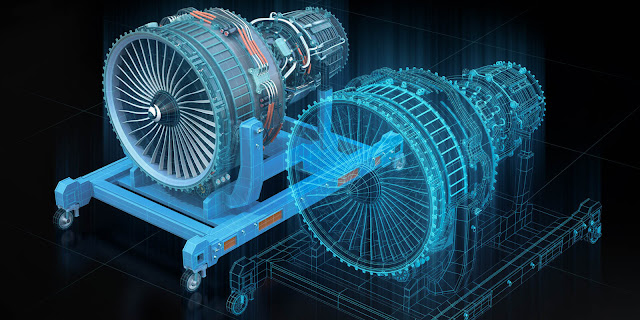Industry 4.0 is transforming the biopharmaceutical manufacturing process with improved efficiency, productivity and waste reduction. The technological advancements of Industry 4.0 are helping pharmaceutical companies adapt to the industry's biggest challenges today. How are new technologies benefiting biopharmaceutical manufacturing?
By Emily Newton
Applying AI to Pharmaceutical R&D
One of the biggest challenges facing the biopharmaceutical industry today is a growing skills shortage. Studies estimate the pharmaceutical industry hiring pool is at least 14% smaller than current staffing demands. This is an unfortunate side effect of Industry 4.0, but developments also provide a solution.

New technologies can fully or partially automate previously time-consuming tasks in the biopharmaceutical manufacturing process. For example, AI algorithms can rapidly analyze millions of protein combinations to identify those with potentially promising qualities. This significantly reduces R&D time for new products by allowing scientists to focus on compounds that already show potential.
Engineers at Carnegie Mellon University have developed a machine learning algorithm that can use unlabeled data sets to assess molecules for possible drug toxicity. This is a significant advancement since the process of labeling data for drug discovery algorithms is highly time consuming itself.
Fully automating preliminary drug discovery and screening using AI can reduce the demands on understaffed R&D teams, allowing them to thrive despite the skills shortage. Industry 4.0 gives pharmaceutical employees the tools they need to maximize the value of their time on the job. AI and machine learning allow R&D teams to fast-track new products to market without compromising safety or effectiveness.
Automating the Biopharmaceutical Manufacturing Process
Almost every stage of the biopharmaceutical manufacturing process can be automated using robotics and AI. Adopting automation technologies can improve product quality and reduce waste in the manufacturing process.
Minimizing Manufacturing Waste
Single-use items minimize contamination risks, which is crucial for products with high purity or sanitation standards. While these items are only intended to be used once, businesses can still maximize the value of every unit by ensuring none unnecessarily goes to waste.

One of the top benefits of automation in the biopharmaceutical manufacturing process is improved accuracy and consistency, which translates into reduced wasted resources. Robots can perform the same task countless times without diminishing precision or accuracy.
In contrast, a human may lose focus on the job or suffer from fatigue. This increases the likelihood that mistakes will cause materials — like valuable single-use products — to go to waste, leading to lost revenue. Industry 4.0 is sparking key advancements in robotics that allow biopharmaceutical companies to automate delicate manufacturing processes so they can increase productivity and reduce waste.
Soft Robotic Grippers
In the past, robotic manufacturing systems often had to be specifically designed to handle products like Petri dishes or glass vials. Soft robotic grippers now offer a general-purpose option for working with delicate pharmaceutical items.
This type of gripper includes many technologies, like pneumatic rubber claws or vacuum suction. Soft grippers are able to pick up fragile items like peppers or marshmallows without causing any damage to them. General-purpose soft grippers could allow pharmaceutical companies to use robots to automate a broader range of tasks than was previously possible.
Back-Office Automation
The largest source of wasteful spending in the pharmaceutical industry is administrative tasks, which cost an estimated $266 billion annually. Robotic process automation gives pharmaceutical companies the tools to automate back-office jobs to improve efficiency and reduce costs.
Robotic process automation (RPA) consists of software and apps that automate everyday tasks like analyzing spreadsheet data or automatically updating claim statuses. RPA often uses AI and machine learning to add a layer of intelligence to automation. Cloud computing can even help businesses run apps that previously were too resource-intensive to run with on-prem computing infrastructure.
RPA can automate most of the customer service process using natural language processing (NLP). NLP allows AI algorithms to understand natural speech patterns and realistically communicate with humans. These intelligent “chatbots” can handle most basic customer service tasks, allowing human representatives to focus only on customers with specific or specialized needs.
AI-powered customer service isn’t just for B2C pharmaceutical companies, either — surveys show 99% of B2B marketers say AI chatbots increased their lead generation. These bots can partially automate marketing campaigns, fulfill customer service needs and address staffing shortages in the biopharmaceutical manufacturing process.
Easing Supply Chain Challenges
From delays to product availability and surging costs, supply chain struggles pose serious concerns for manufacturers today. Technology can help minimize the impact of ongoing supply chain disruptions.
Pharmaceutical companies can use modeling tools and simulations to predict the impact of delays on their manufacturing process. Businesses can make sure they are prepared by simulating possible disruptions, such as severe weather or a supply shortage. Getting ahead of potential disruptions minimizes their negative impact as much as possible.
For instance, a modeling tool might reveal a particular supplier located along a coast is at high risk of disruptions during hurricane season. With this in mind, a pharmaceutical company could shift to an alternate supplier for part of the year to avoid delays.
AI can also help predict demand for certain products and supplies so businesses can order goods more efficiently. Algorithms are great at pattern recognition and are able to process massive amounts of data far faster than humans.

Companies can use AI to analyze their biopharmaceutical manufacturing process data and identify trends in resource utilization and supply needs. This will highlight the goods being used most and predict which products will soon be in high demand internally based on upcoming projects. Demand forecasting data allows pharmaceutical companies to order products well enough in advance to reduce or avoid the impact of supply chain disruptions.
Advancing the Biopharmaceutical Manufacturing Process
Industry 4.0 is bringing countless new technologies to biopharmaceutical manufacturing. Advancements in robotics and AI make it possible to automate more manufacturing tasks than ever. With these new technologies, pharmaceutical companies can revolutionize their manufacturing processes.
Pharmaceutical Microbiology Resources (http://www.pharmamicroresources.com/)



No comments:
Post a Comment
Pharmaceutical Microbiology Resources